Greetings, good day, howdy, and Bah-weep-Graaaaagnahwheepnini bong, gamers, and welcome to the inaugural Transformers: The Trading Card Game article here on CoolStuffInc.com. In this installment I'd like to take some time and talk about a few reasons why, with so many TCG's and CCG's on the market already, you may want to sit up and take notice of this officially licensed game featuring giant shape-changing robots battling each other in an endless war that spans generations. This isn't going to be a how to play article, nor will it delve too deeply into the actual rules of the game, since that information can be found in many other places. Instead, I'd like to talk more about reasons WHY you should play the game.
With the plethora of other TCG/CCG's out there, it is often hard to try and decide which to invest your time and money into. On the one hand, you may really like the license or art or setting that a game is in. On the other hand, you're probably also wanting to make sure that the mechanics of the game are solid and captivating, and probably also looking at whether the game's design allows for a multitude of ways to play.
Today I'd like to help you with that decision by talking about three of the more interesting and unique game mechanics in TF:TCG that helps set it apart from the pack. First, we'll start with the real meat of the game, its characters and their impact on the game's core design. Then we'll talk a bit about the unique challenges that the overall mechanics of the game bring to strategic deck-building and play theory. Finally, we'll talk about the diverse range of play formats that are officially sanctioned by the publisher and how those formats are helping to shape the design of the game itself, instead of the other way around.
Characters!
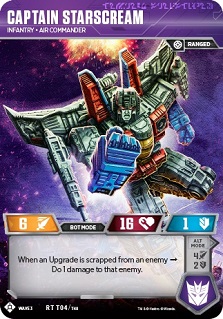 | 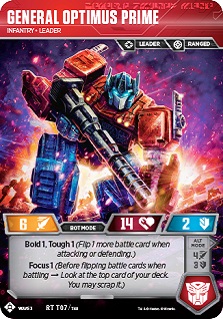 | 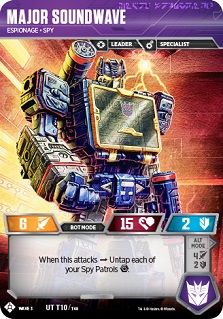 |
Transformers is a franchise centered around giant robots that can switch between different modes at will. One moment you're looking at sweet high-performance sports car, and then with a quick week-onk-chunk you've got a bad mamma-jammin' cybernetic warrior on your hands. While the types of modes that these Robots in Disguise can take has changed over the decades; from standard earth vehicles to dinosaurs to futuristic space ships to boomboxes and beyond; the central theme has always stayed the same. Transformers transform... a lot. The card game, then, would be doing a disservice to its namesake if one of the central mechanics wasn't somehow linked to this theme.
Enter the first major component of a TF:TCG deck, the characters! Most deck-builds (but not all, which we'll talk about later) start with picking your characters, and then building around the synergies, strengths, and weaknesses of those characters. Now, this isn't exactly unique to this game, certainly. Other games like Dragonball Super and the like also have you picking a character build around, so what makes characters in Transformers so special? Well, glad you asked!
Since the major theme of Transformers is, as we discussed, transforming, naturally the characters in the card game can switch easily between their various modes, usually by flipping them from one side to another. Each mode of a character can have different stats for attack and defense, and different abilities to reflect the different combat capabilities of the mode that they're in. Now, while a character flipping from one form to another in games isn't unheard of, the fact that Transformers characters can do it pretty much "at will" sets it apart. In other games, like the aforementioned Dragonball Super, your character only changes when certain requirements are met, or when a specific card is played, etc. but in Transformers, you will have the opportunity to switch one of your character's modes at least once per turn, every turn.
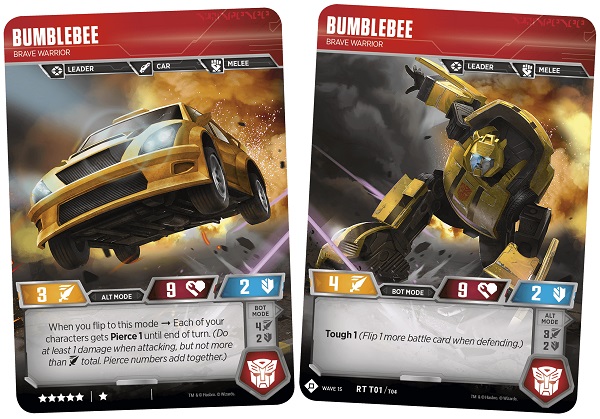
With multiple effects that trigger on the transformation, and with a multitude of cards that allow you to transform your characters more than once per turn, it becomes easy to see how choosing the right character with the right modes and right abilities can drastically inform your strategy.
With the second set, Rise of the Combiners, the idea of gestalt combiner characters from the long history of the Transformers franchise was also ported into the game. Now, instead of just having your team of characters who can each transform into their various modes, they can also combine to form one mega-character with bigger stats, bigger abilities, and just being bigger overall!

Having characters that form together into big stomping hulks not your thing? Then the game also has you covered with characters that turn into weapons and armor for your other characters to use. The third set, War for Cybertron: Siege introduced us to Battlemasters, characters that, when they're KO'd, immediately transform into equipment for your characters who are still battling it out.
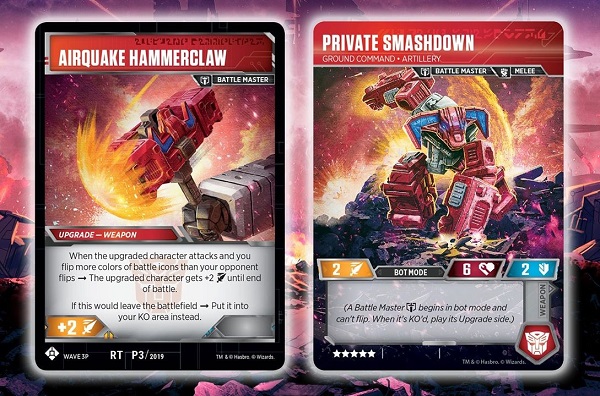
So what happens when the team you've assembled runs up against a rival team who are just a little too hot to handle? Well, Wizards of the Coast has you covered! WotC has a long history with Magic: The Gathering when it comes to rules around playing matches, and one of the most highly regarded mechanics for "fixing" bad matchups is the idea of side-boarding. If you're unfamiliar with the term, side-boarding basically boils down to having a few cards set aside that aren't part of your main deck that you can swap out between games in a match to help better answer the challenges your opponent's deck is throwing at you.
Transformers TCG takes this idea and incorporates it into its own match-play rules, and even goes a step further with allowing you add a character card to your sideboard as well as cards in your main deck. This ability to switch out your character line-up is, to my knowledge, totally unique to Transformers (if I'm wrong, please let me know what other game does this, I'd love to try it!). This, along with the normal deck side-boarding, really adds a whole new level of deck-building strategy to the game, as you'll have to make sure that whatever character is side-boarded in or out meshes well with the strategy that your deck is relying on.
And speaking of deck-building strategy...
The Challenge of Deck-building
In the majority of TCG/CCG's, you build decks based around having certain cards in your hand that you can play at a given time for maximum effect. While this isn't un-true for the Transformers TCG, there is a bit of an added complication in that your deck also does double duty as your card pool for combat as well. Each turn during a combat, you are forced to flip at least 2 cards off the top of your deck for the purposes of attacking or defending. At the same time, you're only guaranteed to draw a single card every turn, meaning that without any other effects in play, you'll be sending twice as many cards per turn to your discard pile as you will be getting into your hand to play. There are, of course, things in the game which can allow you to draw more cards, play more cards, flip more cards in combat, etc. but it doesn't change the fact that you're going to see a good number of your cards being used for combat flips instead of coming into your hand to be played for their printed effects.
Now, we'll get into a lot more about deck-building strategy in later articles, so don't expect a lot of that here. For now, though, suffice it to say that the very gameplay of TF:TCG makes the selection of each and every card going into your deck a massively weighty decision. Do you add a card because of its killer effect when played at just that right moment to disrupt your opponent's plans, or do you set that one aside in favor of a card that has just the right battle icons you need to do maximum damage, or possibly trigger one of your character's abilities during combat? Each and every new deck you build is like a brand-new puzzle that has to be solved to get that ratio of effectiveness JUST right in order to take you to that next level of play.
What sorts of play, do you ask? Well...
Play Formats
As mentioned earlier, TF:TCG is brought to you by the same company that brings us Magic: The Gathering, and if we know anything about M:TG and WotC, it's that they really do love bringing a wide variety of different formats to the table to help keep the game as fresh as possible for as many different people as possible. Transformers is no different in this regard, and with only three sets under its belt as of the writing of this article, there are already a wide variety of both Limited and Constructed formats to take part in.
If you enjoy assembling a team of your favorite giant robot warriors and building out an awesome deck of powerful cards to support their struggle against their many foes, then there's the normal Standard Constructed format. Consisting of 25 stars worth of characters and 40 battle cards (with relevant side-boards) and played over a series of best 2 out of 3 matches, this is the format that most closely resembles what many people think of when the idea of playing TCG/CCG's bubbles up. It's a strategic battle of wits against other like-minded players where deck-building strategy and character synergy are the keys to victory.
Looking for something that allows for playing a wide variety of characters and battle cards that you may not see much of in a meta-heavy Constructed scene? Then look no further than the TF:TCG Draft format. While this format does share some similarities with a M:TG draft, there are also key differences, mostly because the oversized character cards aren't a part of your deck. Instead, what you get is two mini-drafts inside of a single draft. First, the characters are all laid out in a common pool, and starting with a random player, they are snake drafted until gone. Then the battle cards are opened and drafted in a more traditional manner, alternating directions with packs. Also, each Transformers draft uses 4 packs per player instead of Magic's 3 per player, but this is mostly due to having only 8 battle cards per pack.
And what if Draft is a little too slow for your tastes? What if you want to jump right into the action and start battling someone in a fast, furious, intense melee? Then Transformers : TURBO is right up your alley! Each player opens 2 packs and plays with the characters inside those packs (special rules for the Siege set, though, since there's technically 2 characters per pack instead of 1 as in previous sets) and the battle cards. Once each player has their 2 characters laid out, the difference in star costs between the two teams is dealt as damage to the team with the highest star cost. Then, without even looking at the cards in your battle packs, both players shuffle up and draw a single card, then start play! As you can imagine, TURBO is a very quick format that emphasizes a sharp wit and a mind for picking out small turn-by-turn strategies.
Clearly not all these formats are for everyone, and I've got a gut feeling we'll start seeing some multiplayer or team-based formats slip out of WotC for this game over time along with some other formats as well. However, one key element that we've seen from the Transformers development team is that they keep all these formats in mind when designing new sets, and for the moment that shows quite well. Drafting and Turbo, despite being Limited formats, are still great fun and tend to be well balanced in the grand scheme of things. That dedication to keeping the mechanics of the game fun in all supported formats shows that the design team over at WotC aren't just phoning it in because they got a license. This is a game they're working hard to support and grow, and it shows in every aspect the design and implementation of mechanics and rulings.
So, Should I Play This?
If any of the things I've touched on in this article make you sit up and go "that sounds really cool!" then yes, you should, most definitely, play this game! And even if you feel that you're a little bit on the fence about jumping in and investing fully, I highly recommend picking up one of the amazing Pre-Constructed starter decks on sale here at CoolStuff Inc. Each one is a great way to get started in the game, and they showcase a good number of the more specialized mechanics from each wave so far.
So, grab a friend and some starter sets and see if the game is for you. Or, if you're more adventurous, buy a few booster packs and give the Turbo format a spin! Want to see more that the game has to offer? Grab a booster box and do some drafts with some buddies to get a good idea for the overall mechanics and balance of the game.
But no matter what you do, remember to have fun with it!
Now Transform, and Roll Out!

























